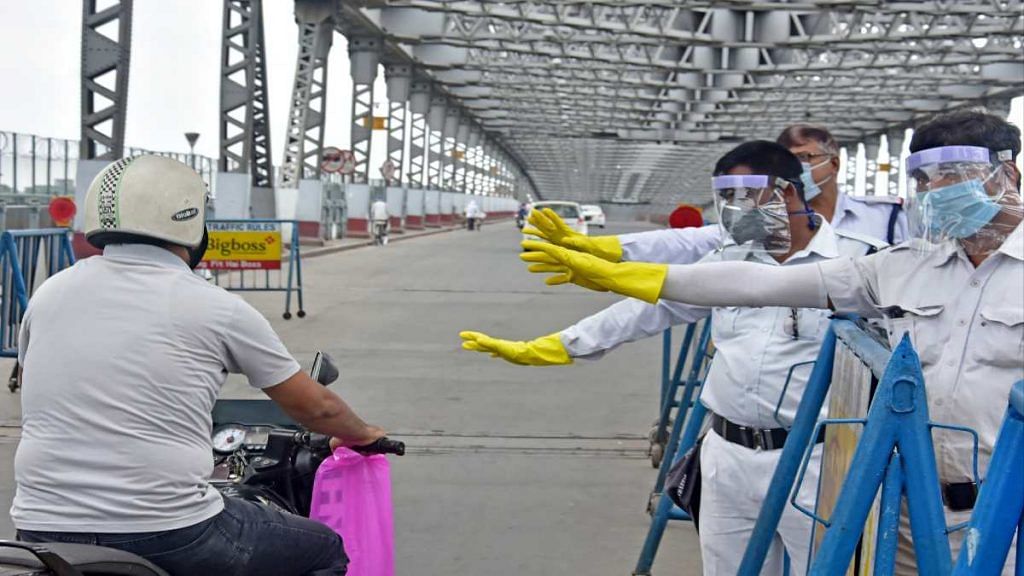Kolkata: The Covid-19 toll for West Bengal went up by three times Friday, hours after the central government wrote to the state chief secretary asking for “case records” of all coronavirus-linked fatalities that had been attributed to other causes by an expert panel constituted by the Mamata Banerjee government. The panel was formed earlier this month to “audit” coronavirus fatalities reported by hospitals in the state.
The state government said Friday that 57 Covid-19 patients had died in West Bengal but sought to clarify that 39 of these had succumbed to “comorbid conditions”. Coronavirus infection, it added, was ruled “incidental” in their death. Until Thursday, figures released by the state government had pegged the number of deaths at 15.
The fresh information came hours after the inter-ministerial central team (IMCT) wrote to West Bengal Chief Secretary Rajiva Sinha, seeking answers on the formation and functioning of the expert committee.
Also Read: Nobel winner Abhijit Banerjee to guide Mamata govt on beating lockdown impact on economy
‘57 deaths evaluated so far’
At a press conference Friday, Sinha said the committee had submitted a comprehensive report that stated it had so far “evaluated” 57 deaths. The committee, he added, had ruled Covid-19 as the primary and direct cause of death in 18 of these cases. In the remaining 39, Sinha said, coronavirus was declared an “incidental finding” and the deaths were attributed to “severe comorbid conditions”.
Global trends thus far have indicated that coronavirus, which has an overall low fatality rate, is quite lethal for those with comorbid conditions such as diabetes and hypertension, and the elderly. This fact raises questions about the government’s approach to analysing coronavirus fatalities.
The expert committee
The expert committee of five doctors that audits Covid-19 fatalities in West Bengal was formed on 3 April.
Only three coronavirus deaths were declared in West Bengal before the committee was formed and the figure has been updated only six times in three weeks. The committee is said to meet twice a week to determine the cause of death.
The committee comprises the state’s director for medical education. It follows a checklist of at least 24 points, including comorbid conditions, to ascertain “the cause of death” of a person “who has tested positive for Covid-19”.
Other checkpoints include providing a patient’s history, including “duration and type of fever, sore throat, breathlessness, complete blood count, sodium and potassium levels” etc.
Hospitals across the state have been asked to adhere to the checklist and attach “supporting documents” for an “audit” by the expert committee.
According to the expert panel’s report submitted Friday, accessed by ThePrint, the “committee examined all the relevant documents including… treatment history, laboratory investigation reports, death certificate and other documents sent by the hospitals concerned” and found 18 deaths to be the result of Covid-19.
The rest were attributed to “comorbid conditions” like “cardiomyopathy with chronic kidney disease, renal failure, cerebro-vascular-accident, acute lymphoblastic leukaemia, multi-organ failure in type-II diabetes and so on”.
Asked if the distinction made in the classification of Covid-19-linked deaths was in line with ICMR guidelines, Sinha said it was a technical issue he couldn’t comment on.
“There are doctors in the expert committee. They had taken up cases of death that happened even before the committee was formed. The medical reasoning and cause of death can only be determined by doctors. We are bureaucrats and we cannot comment on that,” he added.
Also Read: 3 Bengal districts tagged hotspot by Modi govt ‘haven’t reported Covid-19 cases in a week’
A nudge from IMCTs
The IMCT, which landed in West Bengal three days ago amid much opposition from the Mamata Banerjee dispensation, shot off two letters to the state government Friday, seeking a five-point clarification about the expert committee.
The letter, signed by IMCT leader Apurva Chandra, seeks the government order issued to constitute the committee, case records of all Covid-19 fatalities attributed to other causes by the panel, time taken by the committee in coming to the conclusion, whether there are similar committees in the state to ascertain the cause of death for other diseases, and whether such a committee is in line with ICMR guidelines or medical practice. The IMCT also requested an interaction with the committee. There are currently two IMCTs in Bengal, both led by Chandra.
Since the IMCT’s arrival, the state appears to be reporting more cases of Covid-19.
For instance, according to the health bulletin issued 17 April, the total number of active cases was 162. On 20 April, the figure was 245, a rise just under than 100. Four days later, on 24 April, the state reported 385 active cases, an increase of 140.
Testing has also picked up. While 4,212 samples had been tested by 17 April, the number was 5,469 by 20 April and 8,933 by 24 April. The average per-day testing figures have shot up to 943 from 240.
Addressing the media Thursday, Chief Minister Mamata Banerjee weighed in on the discrepancy. She said the central government was either sending faulty kits or withdrawing the ones sent, adding that testing had picked up because the state was procuring kits on its own.
The IMCT’s letters Friday also raise questions about the state’s testing and reporting patterns, besides some “infrastructural issues” at local hospitals.
However, the Trinamool Congress sought to defend its handling of the crisis.
“The problem surfaced here as the Centre sent us all faulty kits. We could not conduct the required number of tests as we did not have kits,” Santanu Sen, a Trinamool Congress MP and former member of the Indian Medical Association (IMA) said.
Also Read: Mamata gives Rs 10 lakh insurance cover to journalists, asks them to report positive news
